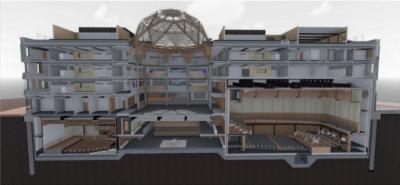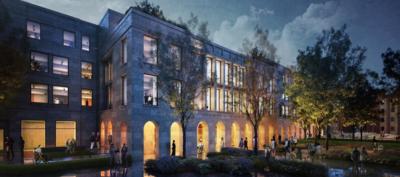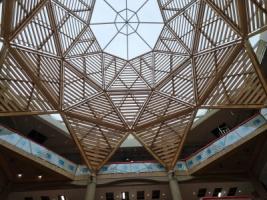Oxford’s Faculty of Linguistics, Philology and Phonetics (LPP) is looking forward to an “extreme makeover” in its physical surroundings, as it prepares to move into the new Schwarzman Centre for the Humanities in September 2025.
Schwarzman Centre
The Schwarzman Centre is the single largest building project ever undertaken by the University of Oxford, with around 250,000 square feet of floor space. It is the centrepiece of the university’s Radcliffe Observatory Quarter (ROQ), a new hub of activity on the site of the former Radcliffe Infirmary, sitting between the Radcliffe Observatory, the Mathematical Institute, and Somerville College. It is the result of a £175 million donation by Stephen Schwarzman.
In the Schwarzman Centre, LPP will be joined by 6 other humanities departments, plus the Oxford Internet Institute, the Institute for Ethics in AI, and the Humanities Division offices, plus a number of sections of the university’s Bodleian Library, and many spaces for teaching and learning.
In addition to its academic spaces, the Schwarzman Centre will also be a major cultural venue for Oxford and the surrounding area, with a 500-seat concert hall, a recital hall, a ‘black box’ theatre, and a movie theatre, in addition to a 250-seat auditorium. Unlike many of Oxford’s buildings that are firmly behind closed doors, a central aim of the building is to welcome the public into a university space.
The Schwarzman Centre also aims to reach new standards of energy efficiency. It will become the largest building in the UK that meets the ultra-efficient Passivhaus standard.

Benefits for Linguistics
Oxford has been a home to cutting-edge linguistics scholarship since the 13th century. The first chancellor of the university, Robert Grosseteste, was very interested in linguistics, among other pursuits.
The move into the Schwarzman Centre marks the first time in over 800 years that Oxford’s linguists will be housed under one roof.
Okay, so that is a bit of a simplification. The 350 members of LPP (students and staff) are active in many of Oxford’s different colleges. Linguists will continue to be found throughout the university. But with many academic staff, most professional staff, most lab spaces, and many shared spaces for meetings and for students and researchers moving together for the first time, Oxford Linguistics will have a clear central home for the first time.
What will be the benefits of the new space?
First, more total space for linguists to gather and work. LPP’s new space will cover around 8,000 square feet (750 square metres), roughly 10% more than its current footprint.
Second, far more coherent space for linguists. LPP is currently spread across different pockets of space in many different buildings. It will become much easier to cross paths with other linguists, and to flexibly use space for the benefit of all.
Third, closer connections with other faculties and institutes. We can already see how this facilitates cross-faculty appointments.
Fourth, greatly improved spaces for students, both in LPP’s own space, and throughout the building. (More on this below.) Student numbers and demand for student places have risen in the past 15 years, bucking the trend in many humanities fields. The new space will fuel further increase in student demand for Linguistics.
Fifth, better spaces for visitors and for events. Oxford is a lovely city to visit, but until now, somebody who wanted to visit Oxford Linguistics did not really have a well-defined place to visit. Now they will have a fabulous place to visit. We look forward to welcoming many more academic visitors in the coming years. We also look forward to using the Schwarzman Centre to host more academic and public-facing events.
Sixth, we will benefit from the building’s excellent social and cultural spaces. Linguists can meet up for coffee or snacks in the large ground floor café or in the great hall. Later in the day they might avail themselves of the foyer bar in the basement, which serves the performance spaces. Or they might even meet outside in the landscaped outdoor gardens, or on the rooftop terrace that is just down the hallway from LPP’s space, looking southwards towards the Oxford skyline.
Also, it surely cannot hurt to be sitting above a state-of-the-art concert hall. (Okay, there may be some concerns, due to the sensitive research in our Phonetics Lab, but the architects have gone to great lengths to ensure acoustic insulation.)

Student Spaces
Linguistics students will have many spaces to meet and study in the Schwarzman Centre, a dramatic improvement over current facilities.
Inside the LPP Faculty space, students will have:
- Two rooms set aside as graduate student workspaces.
- Additional rooms in labs that can serve as student workspaces.
- Common areas available for conversation and quiet study.
- Meeting and seminar rooms available for student use when not otherwise booked.
Close to LPP, within the Schwarzman Centre, students can use:
- Balcony desk spaces overlooking the Great Hall. There will be 56 of these on our floor alone, taking advantage of the octagonal balcony on the highest floor of the building.
- Extensive library workspaces on Floors 1-2, with space for at least 200 users, in the form of individual workspaces or rooms designed for small group meetings.
- Many spaces for individual work or informal meetings on the ground floor: a large café area, a lounge area by the library entrance, and spaces in the Great Hall.
- Congenial outdoor meeting spaces in the warmer months.

Timeline
After a dreaming and planning process that stretches back at least 10 years, the Schwarzman Centre has come together remarkably quickly, under the lead of Hopkins Architects and Laing O’Rourke Construction.
Just 2 years after being a big hole in the ground, as of June 2025, the building is largely completed, and it is undergoing extensive testing and snagging.
The building will pass into university ownership in early August 2025. The month of August will be spent installing shared infrastructure such as libraries, wifi, and teaching spaces.
Academic faculties and institutes will be moved over the course of September, filling up the building from bottom to top. Since LPP is on the top floor, we will be among the last to move. LPP offices will be closed for the move from September 9th.
The building will open for all users starting on Monday September 29th. This is the start of Week -1 for Michaelmas Term 2025. LPP users are welcome to use the building from that date.
The focus of building activity in the first two terms of 2025-2026 is on ensuring the effective basic functioning of offices and teaching spaces.
The roll out of the performance and other cultural spaces will ramp up from Spring 2026 onwards.
Frequently Asked Questions
- Will I have assigned office/desk space in SC?
-
Office/desk plans for permanent postholders and professional services staff have already been confirmed. Plans for other academic staff (postdocs, DLs, etc.) are currently in progress. We hope to have multiple offices available for research and teaching staff, within or close to the LPP Faculty space.
- Who can access SC spaces?
-
The public will be able to access SC ground floor and basement spaces during weekday open hours (8am - 9pm).
Members of SC-based faculties will be able to access all academic (upper floor) spaces during weekday open hours.
LPP members, staff and students, will be able to access LPP spaces at all times, provided they have completed a simple induction process.
- Can I access SC spaces at all times?
-
Yes. After completing a short online training module, LPP members will be able to access LPP spaces plus public spaces plus the Bodleian Humanities Library 24/7.
- How can I reserve a room for a tutorial or one-off meeting or event?
-
Rooms throughout the Schwarzman Centre will be managed using Planon software, with control for different spaces managed by divisional staff, faculty staff or individuals. Some kinds of rooms will require more advance booking than currently, while other rooms may be reserved on a just-in-time basis.
- What will happen to LPP’s lab spaces?
-
With the opening of the Schwarzman Centre, LPP will have 3 suites of lab spaces.
The Phonetics Lab will move from Wellington Square to the SC.
A new Psycholinguistics Lab will be established in the SC. It will have some specialised equipment (EEG, eye-tracking), but it will be mostly flexible space that can be used by many members of LPP.
The Language & Brain Lab will remain in its current location in Wellington Square in 2025-26.
- Can I hold a larger event in SC?
-
Good question! Plans for availability and pricing are very much in progress, but we look forward to working with you to try to help you put on your event.
- Where will I store all of my books?
-
The primary motivation behind the gift that established the Schwarzman Centre is to bring humanities scholars, students and the public together. Plans for the building are therefore focused on people. Various efforts are underway to reduce the amount of objects that are stored in SC. Nevertheless, we recognise that different kinds of objects matter to different kinds of linguistics teaching and research, from books to lab equipment. Unlimited book storage cannot be guaranteed. But efforts will be made to accommodate some storage, while prioritising the need to support people and interaction.
- I am based in a college. How can I use LPP’s SC space?
-
We want LPP’s SC space to benefit all members of the faculty, regardless of where their primary base is. We want to make it as easy as possible for college-based linguists to make use of the SC space. There are various unassigned spaces that will be available for use, and we hope that some assigned spaces can be shared in some way. We will need to experiment with different approaches after moving into SC.
- Will linguistics library books be moving to the Schwarzman Centre?
-
No. The Bodleian’s linguistics collection will remain in the Taylorian Institute.
- Who can use which rooms?
-
Basically, whoever has authorization from the individual who controls the use of that room. All rooms will be card accessible. This will provide great flexibility in managing who can access which spaces in SC.
- What will happen to the current LPP space in the Clarendon Institute?
-
Linguistics has already been removed from the sign on the front of the Clarendon Institute. So, clearly, we will no longer be in that space. We do not have information on who will move in after us. The university has plans to redevelop Wellington Square.
- What will happen to other humanities spaces across Oxford?
-
Current Humanities spaces will be redeployed in a variety of ways.
The departure of English from the St Cross Building will allow Law to occupy the entire building.
The departure of Music from its current home on St Aldates will allow Christ Church to create new graduate accommodation.
The departure of Theology & Religion from the Gibson Building will allow an extreme makeover of the Gibson and Harkness Buildings to create a new home for the Oxford Institute of Digital Health.
The departure of Philosophy and the Humanities Division offices from the Radcliffe Infirmary Building will allow relocation of main university offices, including the Vice Chancellor’s office, from Wellington Square.
It’s a big game of Tetris!